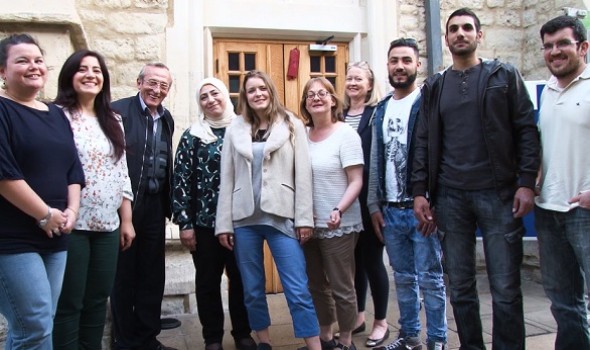An Arabic welcome in Britain
An Arabic welcome in Britain

Unable to return to Syria because of the war, Fardous Bahbouh has helped hundreds of fellow refugees in UK by starting a community group, Ahlan Wa Sahlan - Arabic for ‘welcome’.
She has lived in London for over six years she describes herself as “a happily integrated refugee … deep inside me I have a strong feeling of belonging”.
The conflict started while she was studying for a masters in teaching at London Metropolitan University. Having completed her degree she found she was stuck here: “It’s a very hard feeling, that you can no longer go back home. It was very painful to see the country in war.
“I have great memories of Syria. People there were very kind, and there was a community bond. That’s why when you come to a big city such as London, you feel isolated, you feel alone.”
So Bahbouh identifies with Syrian refugees arriving in the UK, not knowing anybody, having to learn the language, trying to learn everyday life in a new country – “how to open a bank account, where the post office is, why do you drive on the other side of the road?”
People in London are generally respectful, she says, and have the freedom to live their lives the way they choose. Her first neighbourhood in London was near her favourite place, Regent’s Park: “I was impressed that the city had lots of parks and green open spaces. Nearby there was a mosque and a church.”
She works as a journalist, teacher, a translator, voice coach and voice-over artist. Her clients have included the Foreign and Commonwealth Office, the Home Office, the Chatham House think-tank, King’s College London, the World Bank, the British Museum and various production companies. She has certainly made good of her time in Britain.
But she recognises that not all refugees have been as fortunate: “I had already studied in the UK and lived here and I am working. I was in a good position.” That’s why she and friends set up Ahlan Wa Sahlan.
She is the director of the group, which is run by volunteers. “We have the refugees, Syrians and other nationalities, and we have the volunteers, some from the UK but others from all over the world. It’s a community of good people who share similar values, who want to contribute and want a social life. It has indirectly brought emotional support indirectly.”
Bahbouh recalls some touching stories from her work with the organisation. One member was unable to speak any English when he first met the group: he was struggling after losing his house and business in Syria. But his English improved dramatically and he’s now confidently networking to start his own business.
Another member “was almost killed in Syria, spent six months on the journey to the UK, travelled by sea, then walked, and found himself in Calais”. Now he is part of Ahlan Wa Sahlan, learning English, making friends and trying to move forward with his life.
Then there’s the 17-year-old member who found it difficult to adjust when he first arrived in the UK: “But then he found us, a group he can learn English with. He made friends and on Sundays he plays football and he told Bahbouh, ‘I don’t feel lonely anymore in my new life.’”
Of Ahlan Wa Sahlan’s events, one stands out for her: an Eid-al-Fitr dinner in a church. “We had people from different backgrounds, different religions and those with no religion,” she says. “We all celebrated together, and that is the main message: bringing people together with love and empathy.”
Though happy with the group’s achievements, she recognises there is more to be done. The group needs more books and more volunteers, a dedicated project manager and a childminder to take some of the burden off women who want to attend classes to learn English but cannot afford to pay someone to look after their children.
Bahbouh’s aim is to give a voice to those who are under-represented in society by sharing their stories and, by teaching them English, eventually telling their own stories.
“I hope that people currently in the group will make it through the transition period, establish themselves, learn English, start studying and start helping others, and start their own businesses. I hope women will be more empowered – that would be ideal – and happy. I want everybody to be happy.”
She also volunteers with Citizens UK and is on the advisory council for Safe Passage UK. She was present recently when Safe Passage UK won The Jo Cox ‘More in Common’ Award for its efforts in safeguarding refugee children.
When the war in Syria ends, she wants to go back and help with the rebuilding of the country: “That’s why I keep studying and reading and doing so many things – because I feel the country will need very highly qualified people to help.”
For more information:
Fardous Bahbouh: http://www.fardousbahbouh.com/ @fardousBahbouh
‘Alan Wa Sahlan’ Facebook community: https://www.facebook.com/groups/1828571184036454/
Fox News: http://www.foxnews.com/world/2016/08/21/syrian-refugees-support-each-other-in-britain.html
Liberty Human Rights Awards:
A films Fardous helped make with Asylum Aid campaigning to make the UK asylum system fair and safe for women.


